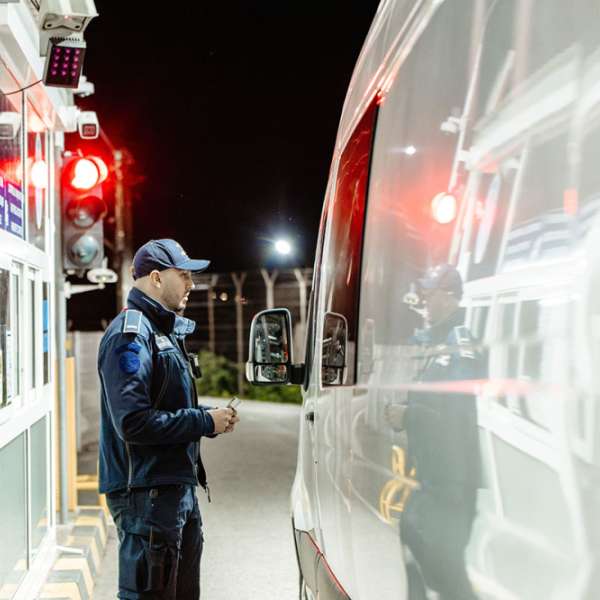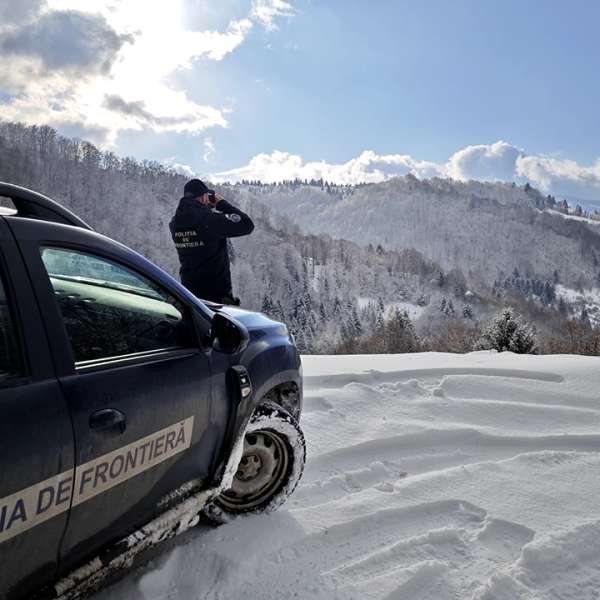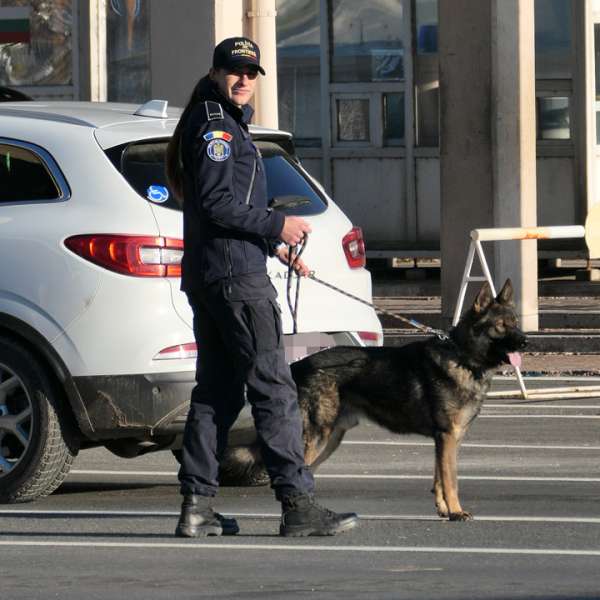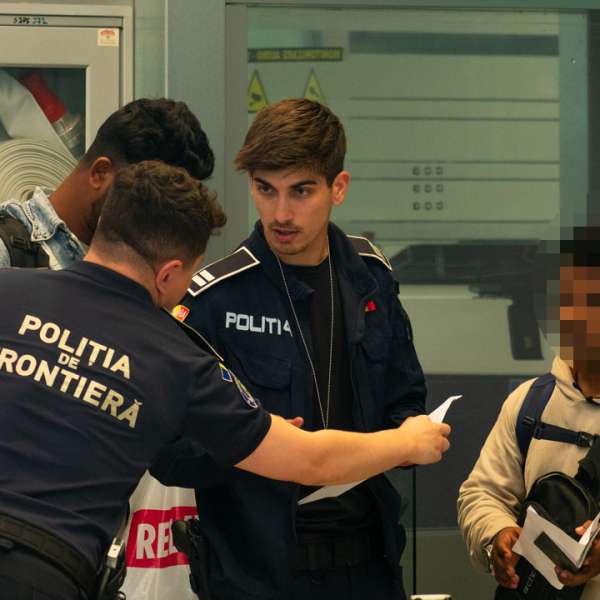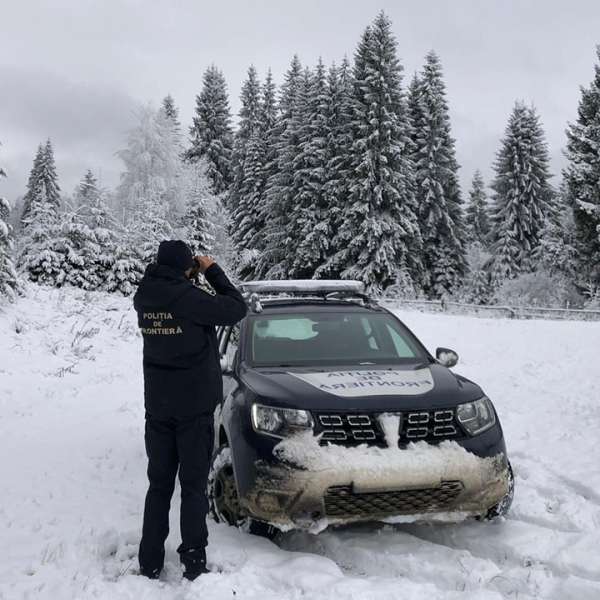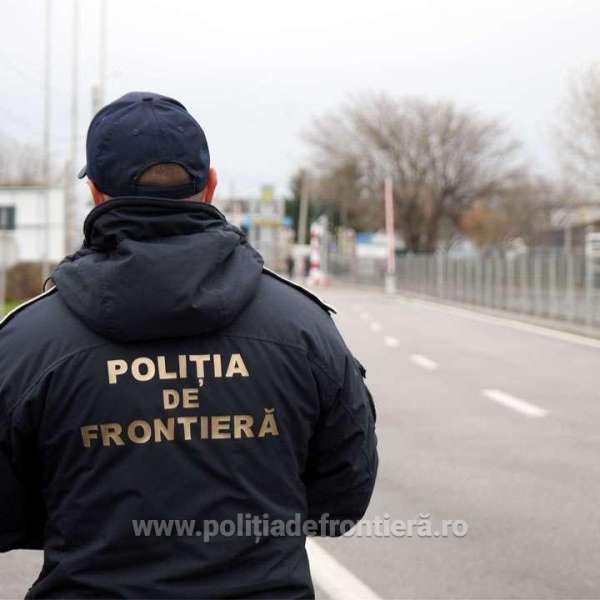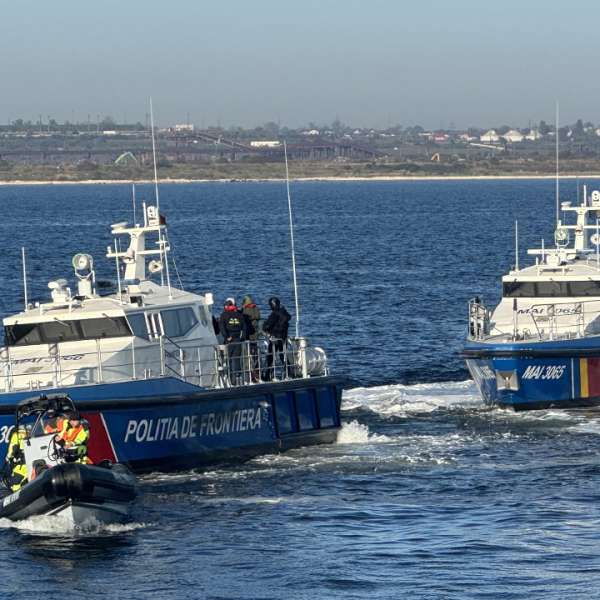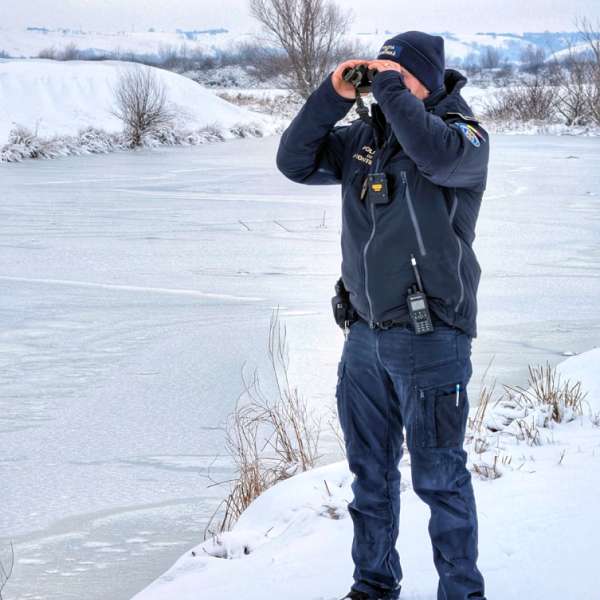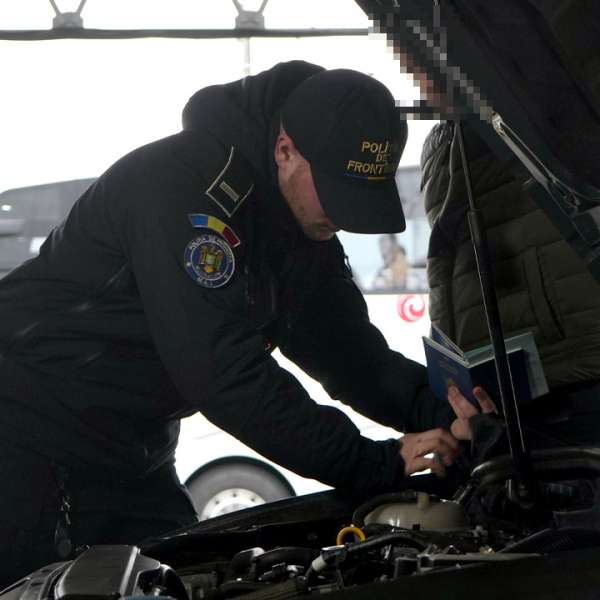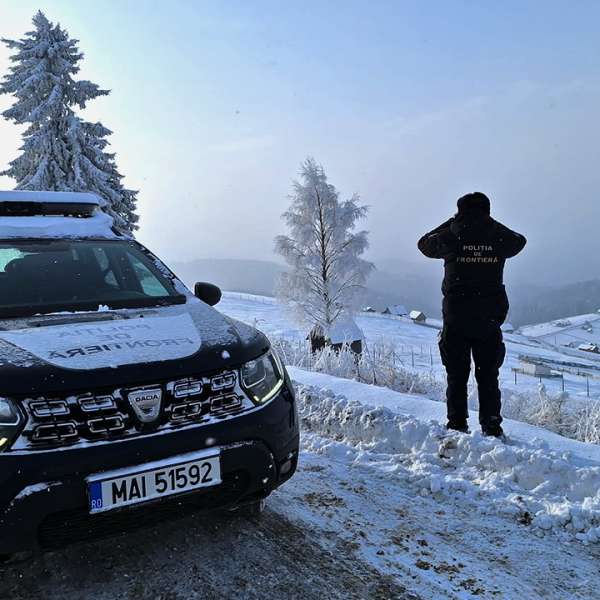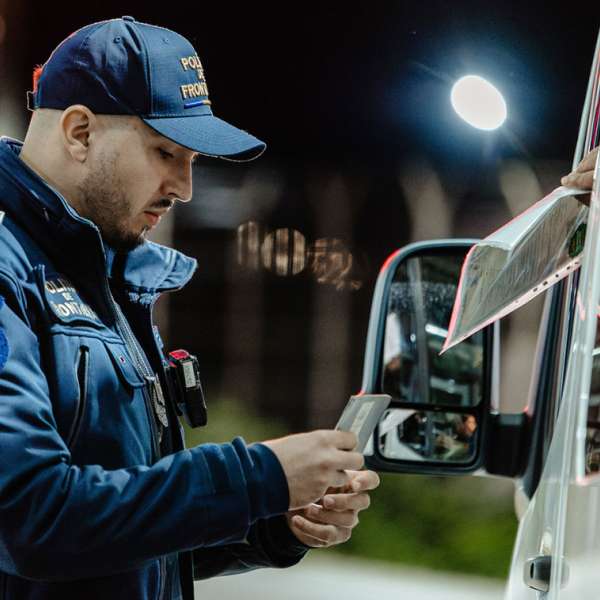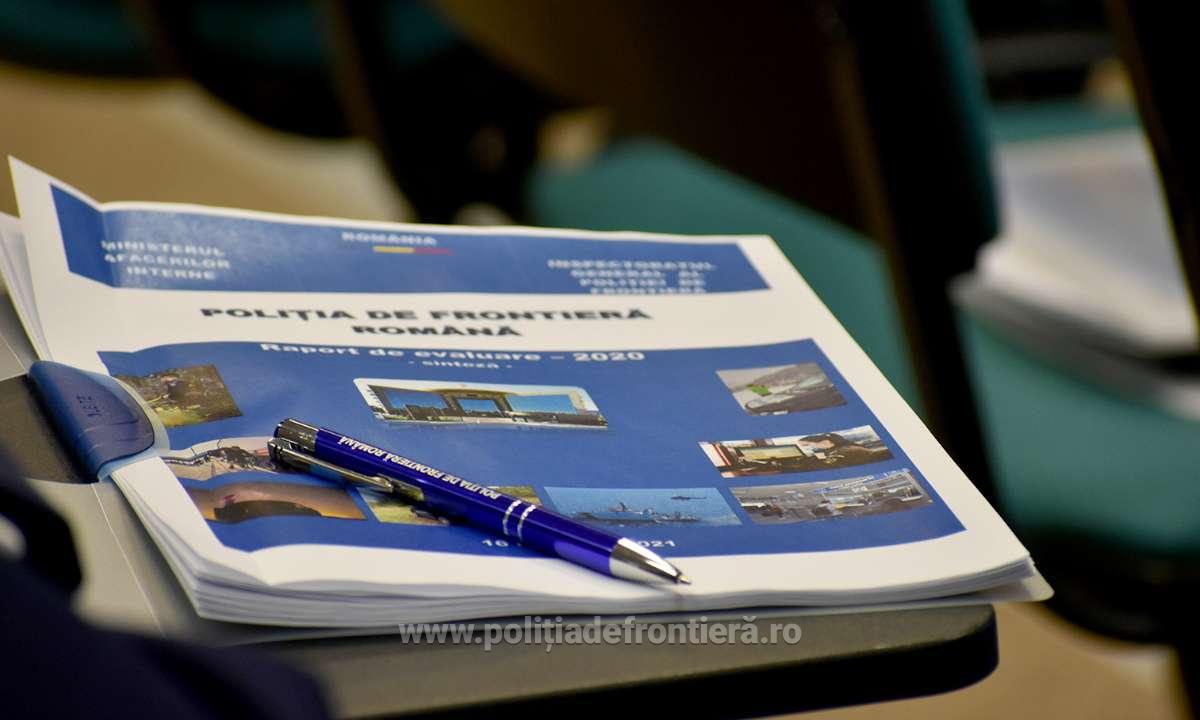
Today, at the headquarters of the General Inspectorate of Border Police, in the presence of Mr. Lucian Nicolae Bode, Minister of Internal Affairs, the evaluation meeting of the institution's activity for 2020 took place in a restricted setting and videoconference system, in compliance with protection rules. On this occasion, Mr. Principal Quaestor of Police Liviu Bute presented the main activities carried out by the Border Police in 2020 and appreciated the border police officers for the special involvement they showed this special year.
In 2020, the Romanian Border Police aimed to fulfill the attributions conferred by the national legislation in force, both in terms of optimizing border surveillance and control, as well as the effective fight against cross-border crime.
At the same time, considering the need to implement the measures established at national level on the line of preventing the spread of the infection with the new coronavirus, the Romanian Border Police aimed at achieving the following objectives:
- Streamlining cross-border traffic by supplementing the staff working on border control, using the infrastructure of crossing points to the maximum capacity, using mobile control equipment in order to increase processing capacity;
- Maintaining the measures adopted in the specific border control activity previously established during the alert state for the management of the spread of infections on the Romanian territory of the SARS-COV 2 virus, before and during the state of emergency;
- Management of illegal migration and cross-border crime registered in the area of territorial competence of the border police, by implementing the specific measures to prevent and combat them in a unitary manner, coordinating activities of subordinate structures and the effective development of actions for the prevention and investigation of crimes limited to illegal migration and cross-border crime within the limits and conditions established by law.
- Ensuring the necessary human, technical resources, means of land and naval mobility, other specific equipment for the fulfillment of specific missions by all subordinate structures.
- Ensuring a high level of representation of the Romanian state, of the M.I.A. and R.B.P. in cooperation relations with similar structures in neighboring countries, with partner structures in EU member states, with European agencies, as well as with other institutions with which it collaborates.
- PERFOMANCE INDICATORS
In the COVID-19 pandemic context, in order to limit the spreading of SARS Cov2 virus and to protect the health of all persons, at international level, several travel restrictions were necessary. These measures had major influences in the international movement of persons, which led to a significant decrease of the traffic of persons and transportation means through the border points, implicitly in the decrease of cross border crime.
- The traffic values recorded at border checkpoints were approximately 28.5 million crossings (23.8 million EU citizens and 4.7 million non-EU citizens), both on the way out and on the direction of entry.
Compared to the same period in 2019, when the values of human trafficking registered at the Romanian borders were 69.7 million, there is a decrease of 59%.
Starting with March, with the establishment of the state of emergency at national level as a result of the pandemic caused by the new coronavirus, there is a decrease in human trafficking values through border points, the minimum being reached in April 2020.
During the analyzed period, the traffic values for the means of transport registered in the border crossing control points were approximately 10.3 million vehicles, with 42% lower compared to the similar period in 2019 (17.8 million means of transport).
- In the context of the decrease of the means of transport, it is observed that the number of freight cars that crossed the state border remained constant compared to the similar period of 2019, when approximately 4.4 million freight cars crossed the border, on both directions.
- In 2020, 16,533 illegal acts were found, of which 8,134 crimes and 8,399 contraventions.
Most of the crimes discovered concerned the attempted or illegal crossing of the border (2,781 acts), followed by the offenses of forgery and use of forged documents (1,081) and of an economic-financial nature, including smuggling of goods (788 deeds).
Last year, most of the criminal acts were detected at the border with Hungary, their number representing 23% of the number of crimes found at the Romanian border. Also, at the border with the Republic of Moldova most sanctions were applied, 33% of the total number.
In 2020, 12,684 foreign citizens were not allowed to enter the country due to non-compliance with the legal conditions, registering an increase of 63% compared to the previous year. The main reasons for ordering the measure to prevent entry into the country were: they did not have the necessary documentation to justify the purpose and conditions of residence, respectively did not hold a valid visa or residence permit, and on public health grounds.
At the same time, over 77,800 Schengen or national alerts were detected at the border control, respectively approximately 380 persons, Romanian and foreign citizens, were handed over to the competent authorities, given in general surveillance.
- On the line of illegal migration, actions continued in an integrated system, as well as measures aimed at strengthening control devices at the border with Serbia and Bulgaria. The increase in the number of crews carrying out state border surveillance activities, the provision of the necessary surveillance equipment, as well as the efficient cooperation with the other structures of the Ministry of Internal Affairs were taken into account, so that the phenomenon is properly managed.
During the reference period, the border guards found in the area of competence 10,586 foreign nationals who tried to cross the border illegally, of which 6,658 on the way into the country and 3,928 on the way out, most of them acting illegally at the border organized in groups of migrants, with the support of some traffickers, thus:
- 1,426 groups of migrants and 363 people were detected, Romanian and foreign citizens, involved in the trafficking of migrants supporting foreign citizens in trying to cross the border illegally.
- 8,874 migrants were found acting illegally at the green border, 1,491 tried to cross the border illegally hidden in means of transport, and the other 221 people were found trying to cross illegally using other methods (travel documents and false visas , substitution of person, avoidance of border control, etc.)
- 3,641 people requested the granting of asylum status to the border police structures, being handed over to the representatives of the General Inspectorate for Immigration for taking legal measures.
Also during the reference period, action was taken to secure vulnerable border areas and increase response capacity, working in collaboration with the Serbian border authorities to prevent the illegal crossing of migrants from the neighboring country.
Regarding the nationality of persons detected in an attempt to cross the border illegally, it is found that most citizens come from the following countries: Afghanistan, Syria, Iraq, Turkey, Morocco, Algeria, Pakistan, Bangladesh, Egypt and Somalia.
Compared to 2019, there is an increase in the number of people detected while trying to cross the border illegally with a percentage of 184%.
For the management of the migration phenomenon at the Romanian border, at the level of the Border Police a series of measures were taken, as follows:
- effective measures have been implemented to combat and prevent fraudulent entries into Romania by strengthening the state border surveillance device, including by carrying out air missions with means belonging to the General Aviation Inspectorate. In this context, air surveillance missions were conducted at the border with Bulgaria and Serbia, depending on the requests of the territorial structures;
- the issue of readmission and of the returned / returned persons was managed, measures regarding the readmission requests sent by the authorities of the U.E. states. and non-EU neighbors were analyzed and ordered.
- In the line of preventing and combating smuggling of goods, 56 crimes of an economic-financial nature and 732 crimes of smuggling and customs fraud were found, the value of the confiscated goods being 170 million lei. Approximately 234 people were found crossing or attempting to cross the border illegally on which goods were discovered that were smuggled or smuggled.
- 2 million packs of cigarettes were seized in order to be confiscated, having an approximate value of 51.7 million lei, over 13,000 kg of tobacco, 205 kg of hookah tobacco and 7 organized crime groups were dismantled for committing the crime of cigarette smuggling, involving 36 people.
- Other property seized for confiscation:
- 22,514 liters of alcohol;
- 25.9 kg of gold and silver jewelry;
- 249 kg amber;
- 317,000 euros and 46,000 dollars.
- On the line of crime with vehicles suspected of being stolen, during the analyzed period, in the area of competence of the border police were discovered 172 vehicles reported as wanted by authorities or suspected of being stolen (137 cars, 19 minibuses, 2 motorcycles, 11 trucks and 3 trailers), 189 crimes being found.
The persons involved in this illicit activity are Bulgarian, Ukrainian, Italian, Turkish, Hungarian, Polish, Norwegian, Moldovan and Romanian citizens.
- On the line of intellectual property right, during the analyzed period, 249 acts of a criminal nature regarding the intellectual property right were found. Thus, the border guards - independently or in collaboration with the customs workers found counterfeit goods bearing the insignia of protected international trademarks, as follows
- 1,011,888 pieces of clothing and underwear;
- 33,853 pairs of shoes;
- 43,412 pieces of cosmetics and perfumery;
- 170,960 pieces other products (electrical, electronic, toys, watches, tools, writing instruments, pharmaceuticals, leather goods, etc.)
Other discoveries, recorded in 2020, were:
- 35 weapons, mostly non-lethal, 4,356 cartridges (mostly hunting), 23,338 kg of pyrotechnic materials;
- on the line of illegal trafficking in prohibited substances, 109 crimes were found, including confiscations including 52 kg of heroin, 30 kg of cocaine, 1.3 kg of cannabis, 2 kg of narcotics and other substances.
- On the line of combating and preventing fish poaching, 1,029 fish poaching offenses were found, 1,429 sanctions were applied in the amount of 439,840 lei and raised for confiscation: 22,547 m monofilament nets, 11,124 m textile nets, 10,615 m nylon nets, 777 other gear, 91 boats, 53 boat engines, 12,145 kg of fish, 264.6 kg of sturgeon and 72.6 kg of caviar.
Actions carried out during the pandemic with COVID-19
Since the appearance and spread of COVID-19 in the states of the European Union, the Romanian Border Police has gradually undertaken a series of measures aimed mainly at strengthening the surveillance and control devices of the border crossing, especially at border points, but also measures to protect their own staff. The institutional effort was limited to the national one, implementing exactly the provisions of the normative acts adopted on this level and adapting, permanently, all the activities carried out, to this reality in a continuous dynamic.
During the state of emergency, the Romanian Border Police, together with the other state authorities, actively and continuously participated in the national effort to protect public health in Romania, by: supplementing the number of arteries for checking freight transport;
- speeding up the control formalities applied to traffic participants in essential categories, including cross-border and seasonal workers;
- cooperation with the staff of the M.Ap.N. allocated in support of activities carried out at border crossing points;
- creation of single corridors for the transit of national territory by third-country nationals returning / repatriating to their countries of origin;
- cooperation with the police and gendarmerie structures in order to organize the transport of people to the places of isolation / quarantine;
- separation of the transit of goods (P.T.F.Nădlac II) from that of persons (P.T.F.Nădlac I);
At the level of the Romanian Border Police, the provisions of the normative acts regarding the declaration and prolongation of the alert state for preventing and combating the spread of the COVID-19 pandemic were implemented, being ordered measures for:
- resumption of trafficking in persons and means of transport through certain border crossing points;
- ensuring the fluidization of traffic through the border crossing points;
- supporting the representatives of the D.S.P. in connection with persons entering the territory of Romania, against whom the measure of quarantine or isolation is decided.
Given the international context and the measures taken by neighboring countries to prevent the spread of the virus, permanent contact has been maintained with the authorities in neighboring countries to ensure a transit corridor that allows citizens to reach their country of residence. An important component of the specific cooperation was to take the necessary measures to properly manage the situation caused by the COVID-19 pandemic, with the border authorities agreeing on measures to streamline traffic and facilitate border crossings.
For the protection of our own personnel, personal protective equipment was distributed at the crossing points, consisting of masks, gloves and disinfectant. At the same time, the staff of the Romanian Border Police was trained on the norms that they must observe when they come in contact with people who come or have transited states or risk areas.
- INTERNATIONAL COOPERATION:
The collaborative activity of the R.B.P. with similar structures in neighboring states took place in very good conditions, both meetings at the level of management of institutions and specific activities according to existing agreements and cooperation plans being held, in the field of ensuring compliance with the legal regime of the state border and in the field of cooperation to combat cross-border crime. On these occasions, the problems registered at the common border were analyzed, including in the segment of the fluidization of the border traffic.
The cooperation through the border offices / centers / contact points took place in good conditions, 26,390 requests for assistance being sent / received to / from the cooperation partners (14,449 requests received and 11,941 requests sent) in the fields of: illegal migration, forgeries in border crossing documents, stolen vehicles, customs fraud, identification of persons with a criminal record, etc.
In 2020, the Romanian Border Police was involved in 12 joint operations, 2 rapid intervention operations and 2 operational projects organized under the auspices of FRONTEX, participating with 279 border guards, experts in various profiles and crew members. During Frontex operations, three maritime patrol vessels, canine crews, patrol trucks and portable thermal imaging cameras were deployed.
The involvement of the Border Police in the activities of the FRONTEX Agency consists in participating with experts / technical equipment in joint operations, organizing joint operations in our country, providing operational assistance for limited periods of time, in the form of border intervention teams, participation with means of naval mobility in the activities of preventing and combating illegal migration at the external maritime borders of the European Union, participating in conducting risk analysis at European level with the help of specialists from the specialized structure of the Romanian Border Police, as well as training police officers. border during specially organized sessions / courses.
The R.B.P. was represented by 14 specialists at the FRONTEX Situational Center in Warsaw, the International Coordination Center in Piraeus and the Local Coordination Center in Gjirokaster, as experts in incident validation and monitoring of suspicious ships. At the end of 2020, the national reserve of experts - EBCGT, made available by FRONTEX, consists of 425 R.B.P. experts, specialized in various profiles. Also, 127 Romanian border guards took part in training program development activities, respectively specialized training sessions on EBCGT profiles organized by the Agency, at European level.
USE OF RESOURCES
- Staff dynamics:
- about 87% percentage of staffing occupancy.
- approximately 81% of the staff work in the operative field and 18% in the support structures.
Ensuring the necessary human resources at the level of the border police structures was one of the priority objectives of the institution, in the context in which R.B.P. has an obligation to carry out specific missions and to ensure a high level of surveillance and control of the entire border, in particular the external border of the U.E.
Thus, in 2020, the necessary steps were taken to fill the remaining vacancies with graduates of educational institutions and the competition procedures for filling 147 positions of officers were started by transferring officers to the corps of police officers.
Thus, the enrollment figures at their own educational units amounted to approximately 215 graduates employed by the educational units with specific “Border Police” / other units that offer the necessary specialization for RBP
- Professional training:
- 575 border guards participated in courses organized by the educational institutions of the P.F.R., M.A.I. or specialized national institutions, within 77 courses for career development / training programs;
- 75 border guards participated in training, specialization and training courses organized under the auspices of FRONTEX, EUROPOL, CEPOL, etc.
- Training / staff motivation
- 1,420 rewarded border guards (22% more compared to 2019)
- 175 border police officers disciplined (increasing by 3.7% compared to 2019). 2 border police officers being dismissed from public office.
- Resurse materiale:
The technical component of the Integrated Border Security System (SISF) consists of its supporting subsystems, as follows: control, surveillance, fixed voice and data communications, professional mobile radio communications, information technology, infrastructure, mobility and integrated logistical support. within each SISF support subsystem were made from the funding sources developed, mainly through the European non-reimbursable funds programs.
In 2020, the development and modernization of the P.F.R. infrastructure remained as a priority, and actions were carried out for the preparation and submission of design documentation, construction or modernization of several offices. Several investment objectives are being implemented, financed by the Internal Security Fund for the extension, modernization and rehabilitation of offices.
- Completed projects: 4 investment objectives:
- Thermal energy rehabilitation administrative pavilion of I.T.P.F. Giurgiu.
- Thermal energy rehabilitation of two pavilions from the S.T.P.F. Arad.
- Thermal energy rehabilitation administrative pavilion at P.T.F. Vama Veche.
-Arranging training spaces at the Initial and Continuing Training School of the Iaşi Border Police Personnel.
- Ongoing projects: 12 investment projects in different stages, which will be completed in 2021
Modernization and extension - 2 offices
- S.P.F. Darabani, Botoșani County
- S.P.F. Băneasa, Constanța County
Construction of offices:
- New U.N.I.P.
- Disaster Recovery Headquarters
- S.P.F. The springs of Suceava
Thermal energy rehabilitation 4 locations:
- I.T.P.F. Oradea city
- SPF Bechet
- PTF Black Water
- SPF Orlea
Rehabilitation, construction, arrangement of premises through cross-border cooperation programs RO-MD RO-UA
- S.P.F. Tomeşti
- Storage of confiscated objects I.T.P.F. Sighetu Marmatiei
- I.T.P.F. Sighetu Marmatiei
Regarding the land mobility system of the Romanian Border Police, it was developed by purchasing a number of 455 patrol vehicles (Dacia Duster and Dacia Logan brands) for field operational work. Also, a project is underway regarding the contracting of surveillance trucks on the principle of Ford Transit thermal imaging, in 2020 26 trucks will be delivered.
Regarding the equipment necessary to ensure the surveillance and control of the border for the fulfillment of the border surveillance missions, in 2020 maintenance services were contracted, the repair or contracting of corrective maintenance activities for the existing facilities that failed to operate under normal parameters: thermal imaging, tilting and rotating platforms, radars, thermal imaging surveillance vehicles with financing from the state budget and from European funds was sought.
At the R.B.P. public procurement procedures / project sheets financed from the Internal Security Fund and budgetary funds were launched for:
- Acquisition of “Fixed surveillance system for video monitoring on the Chilia Arm” - supply contract concluded, the objective being implemented;
- Maintenance services for optoelectronic surveillance systems from SCOMAR composition - evaluation completed, the framework agreement is to be signed;
-Acquisition of evolutionary maintenance of the SCOMAR system - ongoing competitive dialogue procedure;
Public procurement procedures were carried out for the procurement of equipment for the control of travel documents, consisting of spectral video comparators, stationary UV lamps for document examination, compact portable equipment for document and visa examination, special vehicles for document control and verification, as well as and portable Body Woen Camera audio-video cameras.
Within the American program NSDD (Program for the detection and prevention of cases of smuggling of nuclear substances), in 5 border points were installed and put into operation, free of charge, fixed nuclear radiation detection systems, the fixed system already installed at BCP Calafat was modernized.
Overall, the current level of endowment for mobile and fixed border surveillance equipment, as well as for land and naval mobility means, ensures the support of specific operational missions, the degree of endowment being between 39 and 66%.
- Financial resources:
- Budgetary funds: - the budget execution was in proportion of 99.55% and the aim was to respect the financial discipline, to ensure the adequate financing, both of the border surveillance and control activities, and of the financial-logistical activities of the RBP structures, to ensure the balance between subordinated tertiary authorizing officers and the classification of expenditures within the limits of approved credits.
Regarding the way of managing the financial resources, they were used both for granting the financial rights of the staff and for the acquisition of material goods necessary for the institution, payment of utilities, fuels, etc.
- Non-reimbursable financial funds: The Romanian Border Police, through specialized structures, managed projects financed from the INTERNAL SECURITY FUND, as well as projects financed from other types of European funds (programs, mechanisms, non-reimbursable financial instruments) for which the Commission is the financier along with European Union, other national and international bodies, authorities and institutions.
In 2020, at the level of PFR, the total value of non-reimbursable external funds accessed within the projects both through dedicated funds, respectively the National Internal Security Fund Program, as well as through other non-reimbursable funds, is approximately 143 million euros, the value of commitments being approximately 58 million euros, and payments made of 27 million euros.
Object of contracts:
- Maintenance of systems and surveillance and control .
- Acquisition of intervention boats and maritime patrol vessels.
- Acquisition of surveillance and control equipment.
- Development and implementation of IT&C infrastructure for EES and ETIAS.
- Arrangement of the rooms destined to carry out the criminal investigation activities at the level of the R.B.P.
- Construction and rehabilitation of offices R.B.P.
Through non-reimbursable projects, steps have been taken to develop control capabilities at the border crossing, as follows:
- 40 state-of-the-art fingerprint stations were installed, configured, integrated in the national EURODAC system;
- the procurement contract was signed for 6 ABC gates for implementation at the C.S.C.T.F.A. Bucharest-Otopeni of an automatic border control system;
- the acquisition contract was signed for the upgrade to the Automatic Registration Number Recognition-ANPR systems implemented in 4 border points;
- the procurement procedure was performed for the IT equipment related to the Disaster Recovery solution.
In 2021, important contracts worth approximately 41 million euros will be signed for the acquisition of two maritime surveillance vessels (CPV), the acquisition of equipment for EES implementation, as well as for the modernization of the entire SCOMAR system for the optimal development of activities in agreement with the Schengen acquis.
PRIORITIES 2021
For the year 2021, the Romanian Border Police aims to implement the measures targeting the border area included in the programmatic documents, the national strategies, as well as the community normative acts.
- Ensuring and maintaining a high level of surveillance and control at the border and in the free movement area, including by introducing and using modern technologies, at the level of European standards, depending on the operational needs.
- Streamlining traffic across border points, aiming to comply with the provisions of the Schengen acquis, as well as implementing the recommendations of European experts;
- Implementation of large-scale projects at European level:
- Entry / Exit System.
- ETIAS - European Travel Information and Authorization System.
- EUROSUR - European Border Surveillance System.
- SIS II - Second Generation Schengen Information System.
- ABC4EU - Automatic Gate Control System for Border Control.
- Ensuring the necessary support for the programming of actions financed from non-reimbursable external funds, related to the new financial framework 2021-2027;
- Continuation of the implementation process of projects financed from European Funds;
- Acquisition of the technical means necessary for the development of the operative missions provided in the programs financed by external non-reimbursable funds and budget;
- Acquisition of means of naval mobility (5 maritime patrol boats), through the Internal Security Fund;
- Construction of the headquarters of the National Passenger Information Unit and of the ETIAS National Unit;
- Protection of workers at work and prevention of occupational hazards in the context of the COVID-19 pandemic.
